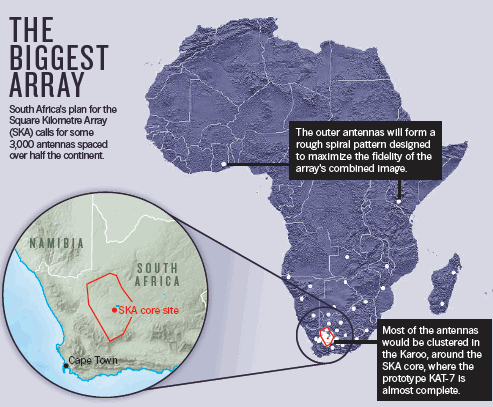|
|
|
|
|
|
|
News & Views item - January 2012 |
![]() A South African View of the Square Kilometre Array. (January 8, 2012)
A South African View of the Square Kilometre Array. (January 8, 2012)
One of the goals driving the former Minister for Innovation, Industry, Science and Research, Senator Kim Carr, before his demotion from Cabinet was to have successfully championed the Australian/New Zealand bid to site the world's largest radio telescope, the Square Kilometre Array (SKA) -- so called because when completed the combined area of its dishes would equal a dish of about one square kilometre.
Currently the Oz/NZ bid is in competition with that of the Republic of South Africa and the December 15, 2011 issue of Nature features a review by Michael Cherry of the South African bid.

Credit Nature
Mr Cherry points out that the competing sites have comparable low radio interference and other factors influencing "seeing" are sufficiently similar that the final decision will rest on other considerations. However overshadowing all is the question as to whether or not the current state of the economies of the consortium of nations* whose astronomers are actively interested in the project will continue to show the political will to support the SKA.
Whether or not the so-called moral imperative will also be under consideration has also been raised. According to George Ellis, a cosmologist at the University of Cape Town: "There is a need for the first world to help the third world build up science; this is an ideal opportunity."
One proposal that has been suggested is what might be seen to be Solomonic: "In July, recognizing the bleak prospects for international funding and the computational challenges, European astronomers proposed a cheaper alternative: fund modest expansions of both ASKAP (Oz/NZ) and MeerKAT (RSA), then combine their signals as if they were a single instrument. The combined array wouldn't have nearly the same sensitivity to very faint signals as the full-scale SKA. But it may well be the most realistic option."
And finally there is the the technological summit that must be conquered: "The full-scale SKA would need thousands of times more processing power than is currently available in the fastest supercomputers ó a big reason why US researchers didn't rank the SKA when drawing up astronomy priorities last year." Adam Burrows, chair of the US National Research Councilís physics and astronomy board is blunt, "It is not clear that the technology for the required correlators is in hand, or even over the horizon; it just may require another decade to establish a credible financial and technological plan for such a massive undertaking."
So while a decision as to placement of the SKA is due by March this year, it wouldn't be overly surprising to find it lacking finality.
_________________________________________
*Currently at least 25 organisations from 15 countries, including Australia, Canada, India, China, France, Germany, Italy, New Zealand, Portugal, Spain, South Africa, Sweden, the Netherlands, the UK and the USA, are involved.